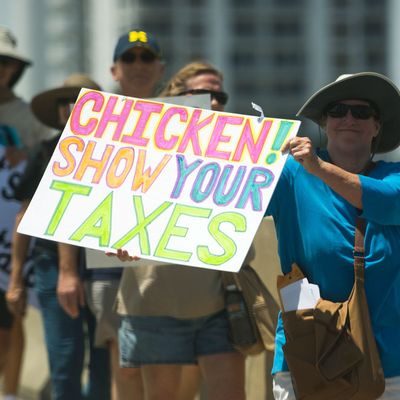
In a revival of legislation that former governor Jerry Brown vetoed in 2017, the California Senate has passed a bill that would deny access to the state’s 2020 presidential primary to any candidate who hasn’t disclosed five years of personal income tax returns. The House has passed it before, and will probably do so again, more or less along party lines. Governor Gavin Newsom hasn’t indicated whether he would sign it or veto it.
The Sacramento Bee described the legislation and its prior disposition in March:
Under Senate Bill 27, presidential candidates from all parties would need to publicly disclose the last five years of their tax returns if they want to have their name on the state’s primary ballot.
Former Gov. Jerry Brown — who didn’t release his own tax returns — vetoed the same proposal in 2017, warning it “may not be constitutional” and could set a “slippery slope” precedent.
State Sen. Mike McGuire, D-Healdsburg, called Brown’s veto “hogwash” and is re-introducing the bill in hopes Gov. Gavin Newsom will sign it. Newsom has promised to be the first California governor to release his tax returns annually.
A similar bill was passed by one legislative chamber in Maryland and in Rhode Island, and parallel legislation has been introduced at one time or another in 22 other states, including Trump’s home state of New York (where Governor Andrew Cuomo is backing it).
Constitutional authorities are split on whether this sort of condition for ballot access would be permissible under judicial review. There’s no direct Supreme Court precedent. But election law expert Rick Hasen, who discussed the issue extensively at Politico last year, found an inferred precedent for this practice in — of all places — Bush v. Gore:
If a state legislature can take back from the voters the right to vote at all for president [as held in Bush v. Gore], it may be able to use ballot-access laws to limit the candidate choices presented to voters. And doing so would not impinge on the Qualifications Clause in Article II because Congress ultimately counts the Electoral College votes and can police that Clause.
But others disagree, as the Associated Press reported in 2017:
The U.S. Supreme Court has held that states and the federal government cannot add to the qualifications of senators and congressional representatives outlined in the Constitution. Some legal experts said that guidance likely would extend to the office of the president.
“I think a requirement of revealing one’s tax returns would be regarded as an additional qualification,” said Michael McConnell, a professor at Stanford Law School. “And then there’s the tax law problem, because federal law guarantees the confidentiality of tax returns. And I think that law would pre-empt any state law requiring someone to divulge their returns.”
If Newsom or some other governor signs such legislation, the case will likely wind its way to the Supreme Court, perhaps before ballots have to be printed for 2020.
If these laws are upheld, the practical effect on Trump might be minimal, so long as the only primary opposition he faces is from nonviable candidates like former Massachusetts governor William Weld. Trump would probably overwhelm Weld with write-in votes alone in most if not all states. And there are only 14 states with Democratic legislatures and governors where passage of punitive legislation affecting ballot access has a serious chance of passage. In a state as important to the Democratic presidential nominating process as California, though, such legislation, even if it’s under judicial review, would most likely raise the number of Democrats (nine so far) who have released their own tax returns.
For Trump, then, such legislation is mostly an embarrassment that keeps the issue of his nondisclosure of tax returns and other financial data in the news. Knowing him, if California becomes the first state to pass such legislation, it will simply add to the volume of Trump’s perpetual rhetorical war on the Golden State, which he’s already accused of election fraud, coddling rapists and murderers, gross mismanagement of forests, and titanic waste of federal tax dollars. Things could get even dicier for California Republicans, who are already in constant conflict with their neighbors on behalf of the distant presidential warlord. But having to defend his secrecy about his tax returns is probably the least of their burdens.






























